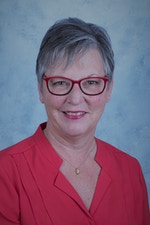Three Illinois State nursing students received a rare opportunity to present their research focused on remapping the birthing process to eliminate the need for a cesarean-section (C-section).
Alex Escobedo, Stone Bock ’16, and Shelby Carpenter are students in the Mennonite College of Nursing’s (MCN) Accelerated B.S.N. option—a program designed for students who have completed a non-nursing bachelor’s degree prior to enrolling. Under the direction of Carle BroMenn Medical Center Endowed Professor Dr. Marilyn Prasun, the three students were selected last spring to present their research class project at the Midwest Nursing Research Society’s (MNRS) annual conference, an uncommon invitation for undergraduate students.
“This group is evidence of pulling together a team of individuals that are passionate about a topic and how quickly they can move forward,” said Prasun, who splits her time between working with nurses at Advocate BroMenn and teaching students at Illinois State. “A project may seem insurmountable at the beginning, but in 16 weeks they developed an extensive literature review, submitted an abstract. It was accepted, and now they’re going to a conference.”
Appears InPrasun got the topic from Advocate BroMenn’s Mother Baby Unit and then assigned it in her Research and Theory for Evidence-based Practice course. When no other groups budged, the three students eagerly accepted.
The students had recently completed their maternal infant clinical together, so the material was fresh in their minds. Despite being passionate and knowledgeable about their topic, the broad nature of their scope posed obstacles at the beginning.
“A big issue at the beginning was figuring out where to even start,” said Bock, who received her previous bachelor’s degree in molecular and cellular biology from Illinois State. “We sat there for quite some time. We had to look for what keywords we were looking for and what databases we were going to use to search the literature.”
The students completed a literature review using online databases and focused on studies that eliminated high-risk pregnancies. After various rounds of gathering, then discarding, information, the students finally found their direction. The group decided to analyze the C-section rates of first-time mothers. According to the students, one in three women in the United States have C-sections, with that number being slightly higher in the Bloomington-Normal area.
One important reason for reducing C-sections is that once women undergo the procedure they are more likely to require it for future pregnancies. Additionally, C-sections are a high-risk operation that should be done only as necessary, according to the group’s research. To reduce C-sections, the students emphasized the importance of evidence supporting nurse interventions in the birthing process.
“We went into this knowing that nurses have an impact, but we didn’t know to what extent,” said Bock. “After we gathered current evidence from the literature, we realized that every single one of the interventions that can promote natural delivery and reduce the need for a C-section, especially in this population, is at the nursing level.
“Nurses are the ones who are at the bedside the whole time that the patient is laboring, and they really can have a massive impact on the outcomes for both the mom and the baby.”
Some interventions that nurses can implement include giving birthing mothers a physical assessment; providing adequate pain management; allowing mothers to eat, drink, and walk around; and ultimately, communicating with the physician.
“We want nurses to advocate and say, ‘Do we really need to do a C-section, or are there other things that we can do to promote a safer birth for the mother and the baby?’” said Carpenter, who received her previous bachelor’s degree in biomedical science. “Nurses need to be focused on all of the tiny details because they really do matter.”
The students presented their findings at Advocate BroMenn before several department heads, where they received praise as well as feedback to continue fine-tuning their project. In preparation for the MNRS conference, the group made several edits to their poster.
“We’ve just been putting all of our brains together,” said Bock. “We’re moving things around and making sure it’s as perfect as we need it to be.”
The team has made sure to utilize their resources, as well. In addition to Prasun, the students cited MCN Associate Professor Dr. Denise Hammer and Advocate BroMenn’s Birthing Center nurse Keli Sidebottom as their support system. “Without them, this project wouldn’t be happening,” said Carpenter.
The MNRS annual conference was scheduled to take place in early April in Schaumburg. However, the conference was hosted via Zoom in adherence with physical-distancing requirements. For the students, it was their first time presenting an evidence-based project on a professional level.
The students said this research experience impacted them as nurses. “We’ll all finish school by August, so this will all be fresh in our minds,” said Escobedo, who previously earned a degree in health sciences, in the spring. “We’ll be bringing this information to our field and applying it.”
As this project was the most intensive research the students had ever conducted, they are proud of themselves and feel that they brought a valuable perspective to their field.
“As students, we ask more questions,” said Carpenter. “We are willing to question everything we read because it’s a big learning curve for us.”
The students were gearing up to enter the field as professionals.
Escobedo planned to work in pediatric oncology, Bock in cardiology, and Carpenter in a neonatal intensive care unit. Each student is aware of the challenges that come with nursing, but their passion for what they do inspires them to prevail. They have developed a mantra: “If you’re not 100% nursing, you’re not nursing at all.”


